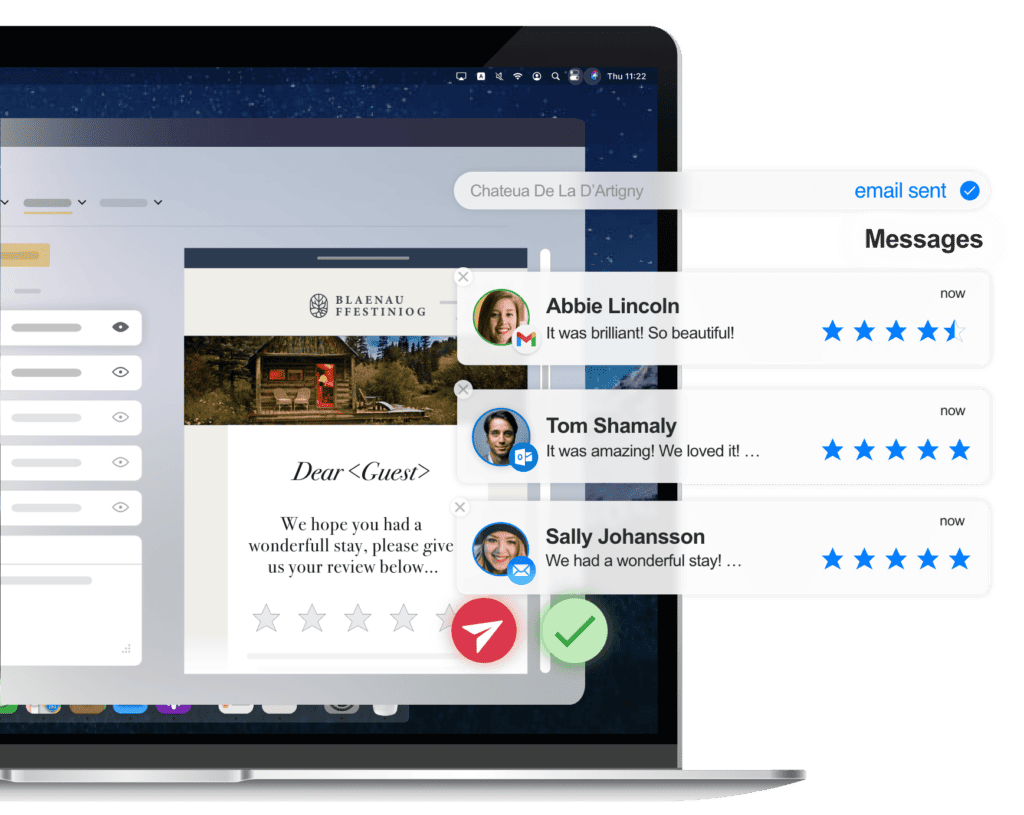Hotel reputation management is all about how you are perceived online. Nobody wants to have a bad stay, so today’s travelers need proof that they’re going to have a great experience at your hotel before they book. And that means they’re going online to find out what people are saying about you.
Read on to uncover our top tips for successful hotel reputation management.
What is hotel reputation management?
Hotel reputation management consists of all the practices you adopt to monitor and manage how your hotel is perceived on the web.
Your reputation management can include:
- Monitoring your accommodation’s reviews on third-party sites (including Tripadvisor, Google, and any other online travel agencies where you list your hotel)
- Implementing tactics to get more reviews, encourage great reviews, and prevent negative ones
- Responding to reviews effectively
- Keeping your hotel’s website optimized for search engines
- Using social media channels to elevate or maintain your reputation

Why is reputation management for hotels important?
Maintaining a good reputation online is becoming vital for hotels to succeed in the digital age. Today, people’s booking decisions typically begin with an online search. Search engines, online reviews and your owned online media (such as your website and social media) have increasingly become the spaces where potential guests learn about your property, find out how you are perceived, and decide whether to book with you.
In particular, sources of online social proof such as customer reviews or aggregated star ratings have become huge influences on consumers’ purchasing decisions. Research has shown that online hotel reviews are now a bigger influence on travelers’ booking decisions than your hotel’s star classification.
79% of TripAdvisor users are more likely to book a hotel with a higher ‘bubble rating’ when choosing between two otherwise identical properties.
In this landscape, effective reputation management brings a range of benefits, from increasing your online visibility and credibility to maximizing your revenue.
Here are 6 ways to ace your hotel reputation management:
1. Get great reviews
Amassing a collection of great online reviews is the goal for every hotelier, and not just for the sake of vanity. Our survey of 7,500 global travelers found that 1 in 5 are most influenced by existing guest reviews when they choose a place to stay, so having guests post about their positive experiences is good for business, too.
However, seeing those great reviews means you’ve got to earn them first. Here are a few things you can do to give guests the top-quality stay they’ll want to post about.
Nail the basics
- Always aim to give guests the best night’s sleep of their lives. Super comfy mattresses and high-quality linens go a long way!
- Keep rooms well maintained and opt for décor that’s in keeping with the rest of the property
- Make sure outdoor spaces are kept clean and up-to-date
- Do breakfast right. If you use locally sourced products, shout about it! (Get more of our breakfast tips here.)
Go above and beyond
Once you’ve perfected the basics, think of what else you can offer guests to really make them feel well looked after. To earn glowing reviews, your goal shouldn’t be to meet your guests’ expectations, but to exceed them.
Here are a few examples of how you can go above and beyond:
- Give guests the option of a hassle-free contactless check-in
- Offer a collection/drop-off service for guests travelling to the nearest station
- Offer to book restaurants for guests prior to arrival
- Give guests maps or instructions on how to get to nearby attractions
From first impression to last, you want your interactions with your guests to be exceptional. Although the above tasks may seem like a lot of effort, they’re worth the outcomes – and you can use automation to help you carry out many of them with minimal exertion.
Once you’ve delivered a great guest experience, don’t forget to ask your guests to leave you a review! You can do this at check-out and/or contact guests after their stay with your feedback request.
2. Respond to reviews (negative and positive!)
Okay, you’re providing amazing experiences, encouraging guests to leave feedback, and the reviews are rolling in. The next step is to make sure you’re responding to them.
Responding to the online reviews your hotel receives does wonders for your reputation because it shows you care about the experiences your guests have. This is especially important if yours is a large hotel that’s at risk of being perceived as impersonal or ‘too big to care’ about individual customers.
Responding to negative reviews can help you spin a less-than-ideal situation into an opportunity to show your attentiveness, graciousness, and willingness to keep improving. It’s just as important to respond to positive reviews. Doing so shows you appreciate your guests’ compliments, and it may even encourage others to follow suit.
We know responding to reviews individually can be time consuming, so here are a few tips to help you streamline the process.
Top tips for your responses
- Create a few sets of templates to speed up the process. Alternatively, download our negative hotel review response examples now.
- Designate a few staff members to handle responses. Get them to follow a ‘tone of voice’ guide so that all comments maintain a consistent tone. Download our guest engagement guides to get you started
- Make sure you close all responses with a positive
- Keep all responses to a maximum of 100 words
How do I respond to positive reviews?
- Acknowledge and thank the poster for leaving the review
- Re-iterate the reviewer’s positive response and use it to upsell
- Make the response personal
- Consider sharing the review on social media
Responding to every review that comes through can be time-consuming. Consider gathering a store of review response templates you can use as a basis for your replies to speed things up.
Use these templates as a launching pad for inspiration rather than a boilerplate to copy word for word. Tripadvisor has found that 77% of travelers are more likely to book with a property owner who leaves personalized responses to reviews, so be sure to inject some variety into each reply!
3. Bring all your reviews together in one place
Staying on top of your reviews is crucial for great hotel reputation management. Gain full control over how you collect, manage and display guest reviews with reliable guest manager software. eviivo Guest Manager offers users the ability to:
- Manage reviews across all your properties in one dashboard
- Keep track of all new reviews so you can respond to them efficiently
- Control which reviews you display on your website (if you’re using an eviivo website)
- Customize and automate your post-departure review request emails
4. Automate your hotel guest management
Effective reputation management is all about being able to elevate the guest experience by communicating with your guests in a timely fashion. This can seem difficult when you’re dealing with the day-to-day demands of your hotel operations. However, by automating certain tasks, you stay on top of your hotel reputation management without a lot of time-consuming manual effort.
With the right guest management software, you can use automation to:
- Email guests useful information (directions, menus, points of interest, etc.) ahead of their stay
- Send a post-stay email to guests asking them to leave a review or just to thank them for their visit
- Automatically publish guest reviews to your website
- Automate and customize your OTA re-confirmation emails so that guests receive all information on their booking in your own words
- Set up rules to send automated emails around payments, cancellations and fees that streamline communications and key processes
Automating these tasks allows you to provide guests with a real sense of hospitality that is great for your reputation. In particular, automated communications allow you to provide extra-special digital interactions while freeing up your team to provide exceptional face-to-face service too.
5. Use hotel reputation management software
Many specialized hotel reputation management software tools exist for you to choose from. Typically, they leverage automation and analytics that allow you to proactively manage your online reputation.
Although your options are varied, there are certain key features you want to look out for when selecting your reputation management software:
- Aggregating reviews: For a complete picture of what’s being said about your hotel online, you need to keep track of multiple review sites, including Tripadvisor, Google and your preferred OTAs. Check whether your software collects reviews from all these sources in one place for you.
- Sentiment analysis: Analytics allow you to take your reputation management to the next level. Consider opting for software that analyzes data from your guests to help you identify causes of dissatisfaction and take the right actions to improve.
- Guest communication: Your guest management and your reputation management are closely entwined. Therefore, software that enhances your guest communication abilities is also likely to benefit your online reputation. Some software allows you to create a customizable, web-based guest app with your own branding, so you’re able to become more responsive for guests than ever.
- Internal reviews: In addition, consider software that allows you to obtain private, ‘internal’ reviews from guests before their departure. This gives you an extra opportunity to manage the guest relationship and take control of the narrative before a public review is published.
Top tip: Make sure you’re able to integrate your PMS (Property Management System) with your chosen reputation management software. This allows guest, booking and review data in your PMS to flow seamlessly to your software for faster, more efficient results.
6. Engage your audience on social media
Social media platforms like Instagram, Facebook and TikTok are the online spaces to showcase your accommodation and interact with a community of followers. This makes social media ideal for building and managing your hotel’s reputation.
Take advantage of social media’s power by posting regularly. Use your social feeds to show off your hotel visually, especially on platforms like Instagram. People want to see where they’re staying, and up-to-date, high-quality photography reassures them you’re proud of your hotel.
Social media also allows you to develop your hotel’s unique brand identity. Showcasing your brand’s voice and personality through your posts and social interactions encourages your customer base to start relating to and trusting you.
For this reason, your brand needs to be coherent and consistent across all social channels. Develop a tone of voice guide to help make sure your communications reflect your brand personality. For more advice on how to achieve this, read our guide to converting your Instagram followers to customers.
Posting on social media also allows you to put your hotel’s authority and unique selling points on display:
- Show off your insider knowledge by posting updates on new developments at the hotel or in your local area.
- Share clips and photos from events at your hotel.
- Offer your followers a glimpse ‘behind the curtain’ by posting content that features your staff.
7. Keep your site optimized for search engines
One vital way to keep control of your online reputation is to make sure your owned media is top of the results page when users search for your hotel. Your owned media includes the range of channels that you have control over, including your social media – but the channel you really want to focus on is your website.
Optimize your hotel website to make sure it outranks bad reviews and any other pages that are damaging to your reputation or goals. You don’t want the first thing prospective guests see when they search for your hotel to be negative!
There are many ways you can optimize your hotel’s website for search engines:
- Make your website responsive, so that it looks and works great on any device (including users’ smartphones)
- Showcase your great reviews on your website
- Keep design elements, like colors and fonts, on-brand and consistent across the site
- Provide a great user experience: take action to eliminate tech issues and optimize how quickly webpages load for users
- Create quality content, like blogs and videos, that is of value to your target audience
eviivo Website Manager allows you to set up a stunning new site fast using mobile and SEO-friendly templates that blend seamlessly with your brand – all minus any hosting or maintenance fees. For more tips on getting started with your SEO, read our beginner’s guide here.
Finally, in addition to optimizing your website for search, create a Google Business Profile for your hotel. Doing so gets you a listing on Google that has priority on the first page of local search results — and it’s free to set up!
Hotel Reputation Management: 7 Best Practices for Success
Key Takeaways
- It’s crucial to monitor and manage how your hotel is perceived online.
- Hotel reputation management includes tracking, encouraging and responding to guest reviews, plus using your website and social media to guide perceptions.
- Go above and beyond for your guests to earn great reviews.
- Respond to as many reviews as possible, both good and bad. Use review response templates to streamline the workload.
- Use strong Guest Manager and reputation management software to automate key tasks and track reviews from all channels.
- Take advantage of your social media channels to present a coherent and consistent brand online.
- Optimize your hotel website for search engines through responsive designs, great UX (user experience) and quality content.



